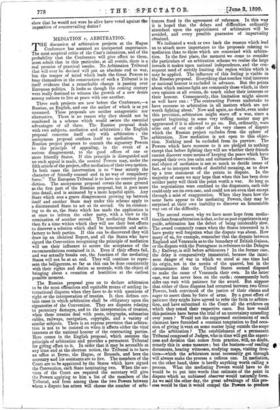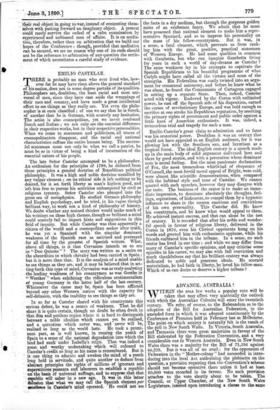MEDIATION v. ARBITRATION. T HE discussion of arbitration projects at the
Hague Conference has assumed an unexpected importance. The most sceptical critic of the Czar's intentions, and of the probability that the Conference will give effect to them, must admit that in this particular, at all events, there is a real promise of practical results. No Arbitration Tribunal that will ever be devised will put an absolute end to war, but the temper of mind which leads the Great Powers to busy themselves in the construction of such a Tribunal is in itself evidence that a remarkable change is passing over European politics. It looks as though the coming century were really destined to witness the growth of a new desire among nations to live at peace with one another.
Three such projects are now before the Conference,—a Russian, an English, and one the author of which is as yet unnamed. These proposals are neither antagonistic nor alternative. There is no reason why they should not be combined in a scheme which would secure the essential advantages of all three. The Russian proposal deals with two subjects, mediation and arbitration ; the English proposal concerns itself only with arbitration ; the anonymous proposal confines itself to mediation. The Russian project proposes to commit the signatory Powers to the principle of appealing, in the event of a serious disagreement, to the good offices of one or more friendly States. If this principle is disregarded and no such appeal is made, the neutral Powers may, under the fifth article of the project, offer mediation of their own motion. In both cases the intervention is to " bear strictly the character of friendly counsel and in no way of compulsory force." The European Tribunal is to have no coercive juris- diction. The anonymous proposal covers the same ground as the first part of the Russian proposal, but it goes more into detail, and is animated by a more hopeful spirit. Any State which sees a grave disagreement growing up between itself and another State may under this scheme apply to a disinterested State to act as its second. On its consent- ing to do so, the State which has made the application is at once to inform the other party, with a view to the nomination of another second. The mediating States will then fix a time within which they will use their best efforts to discover a solution which shall be honourable and satis- factory to both parties. If this can be discovered they will draw up an identical Report, and all the States who have signed the Convention recognising the principle of mediation will use their influence to secure the acceptance of the recommendations contained in it. Even if their efforts fail, and war actually breaks out, the function of the mediating States will not be at an end. They will continue to repre- sent the belligerents, so fir as this can be done consistently with their rights and duties as neutrals, with the object of bringing about a cessation of hostilities at the earliest possible moment.
The Russian proposal goes on to declare arbitration to be the most efficacious and equitable means of settling in- ternational disputes when they have to do with q_uestions of right or the interpretation of treaties. It then defines cer- tain cases in which arbitration shall be obligatory upon the signatories of the Convention. They are disputes relating to pecuniary damages, and to the interpretation of treaties, when these treaties deal with posts, telegraphs, submarine cables, railways, navigation, copyright, and a variety of similar subjects. There is an express provision that arbitra- tion is not to be insisted on when it affects either the vital interests or the national honour of the contracting parties. Here comes in the English propoeal, which assumes the principle of arbitration and provides a permanent Tribunal' for giving effect to it. In order that it may be accessible at any time and at the shortest notice, the Tribunal is to have an office at Berne, the Hague, or Brussels, and here the secretary andhis assistants are to live. The members of the Court are to be appointed by the States which have signed the Convention, each State nominating two. When the ser- vices of the Court are required the secretary will give the Powers applying to him a list of the members of the Tribunal, and from among these the two Powers between whom a dispute has arisen will choose the number of arbi- trators fixed in the agreement of reference. In this way it is hoped that the delays and difficulties ordinarily attendant upon the appointment of arbitrators will be avoided, and every possible guarantee of impartiality obtained.
We indicated a week or two back the reasons which lead us to attach more importance to the proposals relating to mediation than to those which are concerned with arbitra- tion. In the first place, the moment we come to consider the particulars of an arbitration scheme we realise the large inroads it makes upon national independence, and the con- a sequent need of strictly limiting the region within which it vo may be applied. The influence of this feeling is visible in the Russian proposal. Everything that touches vital interests or national honour is excluded in advance. But the points about which nations fight are commonly those which, in their own opinion at all events, do touch either their interests or their honour. Consequently, this limitation might almost as well have ran : The contracting Powers undertake to have recourse to arbitration in all matters which are not worth fighting about.' Now and again, no doubt, even under this provision, arbitration might stave off a war, since a quarrel beginning in some very trifling matter may get aggravated if it is allowed to go on. But, ordinarily, wars arise out of one or other of the very classes of dispute which the Russian project excludes from the sphere of arbitration. Now mediation is not open to this objec- tion. Nothing need be excluded from its purview. The Powers which have recourse to it are pledged to nothing except that before fighting they will see whether their friends cannot discover some means of keeping the peace which have escaped their own less calm and unbiassed observation. The real object of mediation is not so lunch to decide issues of fact, or to interpret words of doubtful meaning, as to draw up a true statement of the points in dispute. In the majority of cases we may hope that when this has been done neither party will think the point worth a war. So long as the negotiations were confined to the disputants, each side could only see its own case, and could not see even that except through a mist of exaggeration. When they learn how the same facts appear to the mediating Powers, they may be surprised at their own inability to discover an honourable way out of the difficulty.
The second reason why we have more hope from media- tion than from arbitration is that, so far as past experience is any guide, arbitration has the defect of being intolerably slow. The award commonly comes when the States interested in it have pretty well forgotten what the dispute was about. How many of us, for example, remember that the dispute between England and Venezuela as to the boundary of British Guiana, or the dispute with the Portuguese in reference to the Delagoa BL7 Railway, is still before arbitrators ? In the former case, the delay is comparatively immaterial, because the immi- nent danger of war in which we stood .at one time had its origin, not in the merits of the quarrel, but in the circumstance that the United States seemed disposed to make the cause of Venezuela their own. In the latter case, war has never been on the cards ; consequently both sides can wait with patience for the award. But suppose that either of these disputes had occurred between two Great Powers, both convinced of the justice of their claims and eager to assert them by force of arms. By a great effort of patience they might have agreed to refer the facts to arbitra- tion, and have submitted to the Court all the evidence on which they rested their respective cases. But how would this patience have borne the trial of an uncertainty extending over years ? Would not the suppressed excitement of each claimant have furnished a constant temptation to find occa- sion of giving it vent. on some matter lying outside the scope of the arbitration ? The establishment of a permanent Tribunal composed of Judges, who in time will get the expert- ness and decision that comes from practice, will,-no doubt, remedy this in some measure ; but the business—of reading documents, hearing witnesses, studying maps, visiting fron- tiers—which the arbitrators must necessarily get through will always make the process a tedious one. In mediation, on the other hand, there is hardly anything worth calling a process. What the mediating Powers would have to do would be to put into words that estimate of thepoint in dispute which an unbiassed observer would naturally form. As we said the other day, the great advantage of this pro- cess would be that it would compel the Powers to produce their real object in going to war, instead of contenting them- selves with putting forward an imaginary object. A pretext could rarely survive the ordeal of a calm examination by experienced and unbiassed men of affairs. It is on media- tion, therefore, rather than on arbitration that we build our hopes of the Conference ; though, provided that mediation can be secured, we see no reason why one of its ends should not be the reference to arbitration of any question the settle- ment of which necessitates a careful study of evidence.







































 Previous page
Previous page